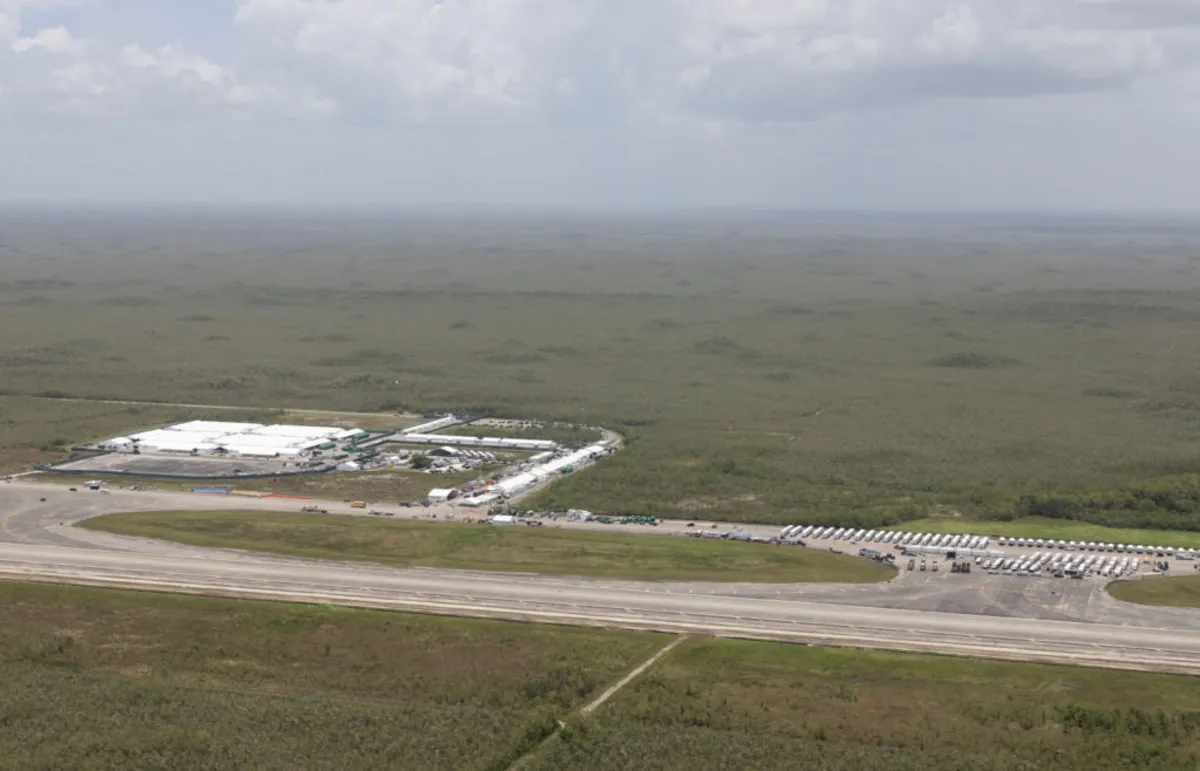
In a significant development for Florida taxpayers, the state may be liable for a staggering $218 million spent on converting a remote training airport in the Everglades into an immigration detention center, infamously referred to as “Alligator Alcatraz.” Recent judicial rulings indicate that this facility could soon be entirely vacated, following a judge’s decision late Wednesday to order the indefinite winding down of operations.
Closing the center, even temporarily, comes with a hefty price tag for the state, estimated between $15 million to $20 million. Additionally, if the state decides to reopen the detention center in the future, reinstituting necessary structures could incur another $15 million to $20 million in costs, as detailed in court documents. The Florida Division of Emergency Management will likely see a significant depreciation in the value of the $218 million invested to prepare this underutilized airport for its new role.
Constructed in a remarkably short time frame, the facility features chain-link cages surrounded by large white tents that house rows of bunk beds. By late July, state officials had already inked contracts surpassing $245 million for the construction and operation of "Alligator Alcatraz," which officially commenced operations on July 1. Recently, former President Donald Trump visited the center, suggesting it could serve as a model for future detention facilities nationwide as his administration seeks to bolster deportation efforts.
The detention center has faced serious scrutiny, including allegations of unsanitary conditions and reports of detainees being obstructed from accessing legal resources. A series of legal challenges has emerged against the facility, culminating in a ruling by U.S. District Judge Kathleen Williams. She rejected requests to stay her order to cease operations, siding with environmental advocates and the Miccosukee Tribe, who argued that the state and federal officials violated federal law by failing to conduct an environmental review for the sensitive wetlands in the vicinity.
Judge Williams noted that the number of detainees had already begun to decrease and maintained that the federal government’s immigration enforcement objectives would not be hindered by a temporary halt in operations. This assertion stands in contrast to claims made by lawyers from the Department of Homeland Security (DHS), who argued that the judge’s ruling would disrupt enforcement activities. When questioned, the DHS refrained from disclosing the current number of detainees and how many had been relocated since the temporary injunction was issued.
The facility was reportedly in the process of emptying as of last week, with the executive director of the Florida Division of Emergency Management, Kevin Guthrie, indicating in a message that the number of detainees would likely reach zero within a few days. Funding remains a pivotal point for the federal government’s argument for the appellate court to overturn Williams' order. Federal attorneys asserted in court filings that federal environmental laws do not apply to states like Florida and emphasized that the federal government has not contributed any funding for the construction or operation of the facility, despite Florida's attempts to secure federal grants.
In a related move, almost two dozen Republican-led states have urged the appellate court to reverse the judge's decision, contending that she overstepped her authority and that federal environmental regulations apply only to federal agencies, not the state of Florida. Meanwhile, Republican Governor Ron DeSantis is preparing to launch a second immigration detention facility, dubbed "Deportation Depot," at a state prison in northern Florida.
In light of the ongoing controversies surrounding the Everglades facility, civil rights groups have initiated multiple lawsuits against state and federal authorities. One lawsuit, filed last month, alleges that detainees were systematically denied access to the legal system. A subsequent lawsuit filed recently highlighted “severe problems” at the facility, labeling issues faced by detainees as “previously unheard-of” in the immigration system.
The future of the "Alligator Alcatraz" immigration detention center remains uncertain as legal battles continue and the state grapples with the financial implications of its decisions. The situation emphasizes the complex interplay between immigration policy, state expenditures, and the rights of detainees.